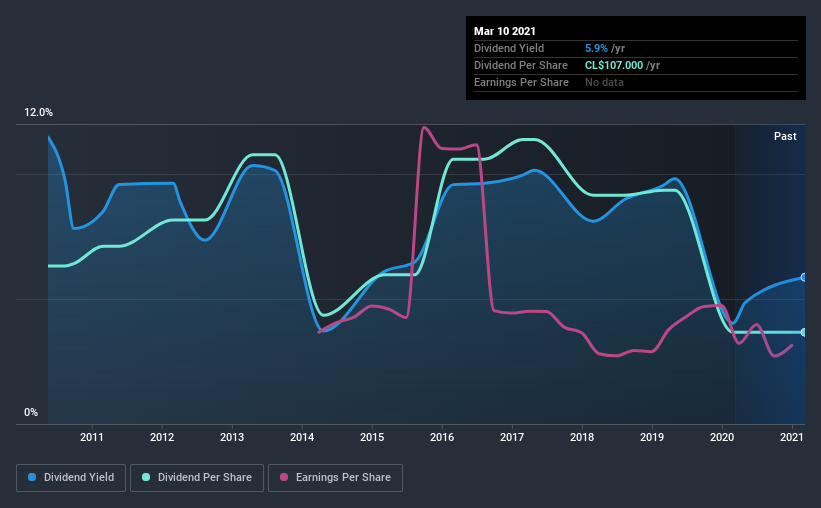- Chile
- /
- Capital Markets
- /
- SNSE:PROVIDA
Should You Buy Administradora de Fondos de Pensiones ProVida S.A. (SNSE:PROVIDA) For Its Dividend?

Is Administradora de Fondos de Pensiones ProVida S.A. (SNSE:PROVIDA) a good dividend stock? How can we tell? Dividend paying companies with growing earnings can be highly rewarding in the long term. If you are hoping to live on the income from dividends, it's important to be a lot more stringent with your investments than the average punter.
With Administradora de Fondos de Pensiones ProVida yielding 5.9% and having paid a dividend for over 10 years, many investors likely find the company quite interesting. We'd guess that plenty of investors have purchased it for the income. There are a few simple ways to reduce the risks of buying Administradora de Fondos de Pensiones ProVida for its dividend, and we'll go through these below.
Click the interactive chart for our full dividend analysis

Payout ratios
Dividends are typically paid from company earnings. If a company pays more in dividends than it earned, then the dividend might become unsustainable - hardly an ideal situation. As a result, we should always investigate whether a company can afford its dividend, measured as a percentage of a company's net income after tax. Looking at the data, we can see that 45% of Administradora de Fondos de Pensiones ProVida's profits were paid out as dividends in the last 12 months. This is a medium payout level that leaves enough capital in the business to fund opportunities that might arise, while also rewarding shareholders. One of the risks is that management reinvests the retained capital poorly instead of paying a higher dividend.
Remember, you can always get a snapshot of Administradora de Fondos de Pensiones ProVida's latest financial position, by checking our visualisation of its financial health.
Dividend Volatility
Before buying a stock for its income, we want to see if the dividends have been stable in the past, and if the company has a track record of maintaining its dividend. Administradora de Fondos de Pensiones ProVida has been paying dividends for a long time, but for the purpose of this analysis, we only examine the past 10 years of payments. Its dividend payments have declined on at least one occasion over the past 10 years. During the past 10-year period, the first annual payment was CL$184 in 2011, compared to CL$107 last year. The dividend has shrunk at around 5.3% a year during that period. Administradora de Fondos de Pensiones ProVida's dividend has been cut sharply at least once, so it hasn't fallen by 5.3% every year, but this is a decent approximation of the long term change.
A shrinking dividend over a 10-year period is not ideal, and we'd be concerned about investing in a dividend stock that lacks a solid record of growing dividends per share.
Dividend Growth Potential
Given that dividend payments have been shrinking like a glacier in a warming world, we need to check if there are some bright spots on the horizon. Administradora de Fondos de Pensiones ProVida's earnings per share have shrunk at 22% a year over the past five years. With this kind of significant decline, we always wonder what has changed in the business. Dividends are about stability, and Administradora de Fondos de Pensiones ProVida's earnings per share, which support the dividend, have been anything but stable.
Conclusion
To summarise, shareholders should always check that Administradora de Fondos de Pensiones ProVida's dividends are affordable, that its dividend payments are relatively stable, and that it has decent prospects for growing its earnings and dividend. We're glad to see Administradora de Fondos de Pensiones ProVida has a low payout ratio, as this suggests earnings are being reinvested in the business. Earnings per share have been falling, and the company has cut its dividend at least once in the past. From a dividend perspective, this is a cause for concern. While we're not hugely bearish on it, overall we think there are potentially better dividend stocks than Administradora de Fondos de Pensiones ProVida out there.
Investors generally tend to favour companies with a consistent, stable dividend policy as opposed to those operating an irregular one. Meanwhile, despite the importance of dividend payments, they are not the only factors our readers should know when assessing a company. Case in point: We've spotted 2 warning signs for Administradora de Fondos de Pensiones ProVida (of which 1 shouldn't be ignored!) you should know about.
Looking for more high-yielding dividend ideas? Try our curated list of dividend stocks with a yield above 3%.
When trading Administradora de Fondos de Pensiones ProVida or any other investment, use the platform considered by many to be the Professional's Gateway to the Worlds Market, Interactive Brokers. You get the lowest-cost* trading on stocks, options, futures, forex, bonds and funds worldwide from a single integrated account. Promoted
New: Manage All Your Stock Portfolios in One Place
We've created the ultimate portfolio companion for stock investors, and it's free.
• Connect an unlimited number of Portfolios and see your total in one currency
• Be alerted to new Warning Signs or Risks via email or mobile
• Track the Fair Value of your stocks
This article by Simply Wall St is general in nature. It does not constitute a recommendation to buy or sell any stock, and does not take account of your objectives, or your financial situation. We aim to bring you long-term focused analysis driven by fundamental data. Note that our analysis may not factor in the latest price-sensitive company announcements or qualitative material. Simply Wall St has no position in any stocks mentioned.
*Interactive Brokers Rated Lowest Cost Broker by StockBrokers.com Annual Online Review 2020
Have feedback on this article? Concerned about the content? Get in touch with us directly. Alternatively, email editorial-team (at) simplywallst.com.
About SNSE:PROVIDA
Administradora de Fondos de Pensiones Provida
Administradora de Fondos de Pensiones Provida S.A.
Flawless balance sheet average dividend payer.
Market Insights
Community Narratives




